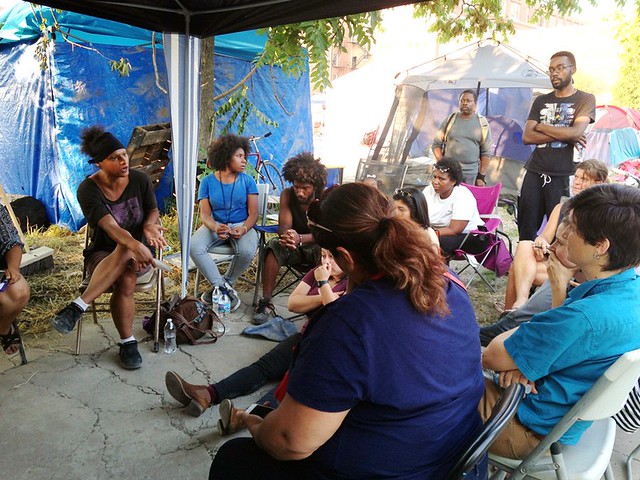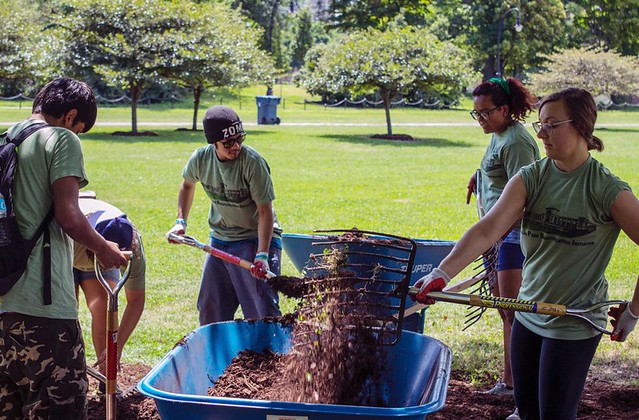
[Note: This Chicago Reader article lies a bit outside Streetsblog Chicago’s usual wheelhouse of transportation and livable streets topics, but since it covers an important local public space issue, I thought it might be of interest to Streetsblog readers.]
August 2 at Freedom Square, a tent city raised across the street from the Chicago Police Department's Homan Square facility as a protest against police brutality, Concerned Citizens of Riot Fest in Douglas Park held an alfresco strategy session. Local resident Sharaya Tindal outlined the group's grievances against the festival, which debuted in the west-side green space in September 2015, for 16 or so people gathered on folding chairs under a canopy.
As I reported in May, Concerned Citizens formed last year when Riot Fest relocated to Douglas Park from Humboldt Park following backlash from Humboldt residents who claimed its organizers failed to adequately repair turf damage. Concerned Citizens argued that the mostly African-American and Latino residents of neighboring North Lawndale and Little Village had been given little to no say in the matter.
At Freedom Square, Tindal discussed how foot traffic from 135,000 attendees at the 2015 festival damaged Douglas Park so badly that much of its south end was fenced off for repairs from late September to late November. Mayor Emanuel, the local aldermen, and the Chicago Park District (as well as Riot Fest itself, of course) had promised the event would bring big economic benefits to the communities. But Tindal claimed that the roughly 150 temporary jobs created didn't make a dent in the area's unemployment problem, that high vendor fees shut out small businesses, and that neighborhood retail strips saw little increase in sales during the festival weekend.
"Meanwhile the city spends extra money on transit, extra money on Streets & San, and extra money on police, and Riot Fest pays nothing for it," Tindal said. "So we pay to get overpoliced, underprotected, and shut out."
From a camp seat, Damon Williams, codirector of the #LetUsBreathe Collective (which is leading the Freedom Square occupation), voiced solidarity for Concerned Citizens in their efforts to oust the fest from the park. "We're here because people are being tortured," he said. "We're here because 70 percent of [young men in] the community have felonies. It's the most closings of public schools. So for people to be having something literally called a 'riot' here . . . "
"Thank you," said Tindal. "[What] poor taste. How disrespectful. How dare you, when people are dying. When our community has not recovered from the last riot in '68. How dare you bring your concert, your merriment, your laugh riot to our broken community."
Not everyone in the area shares that sentiment. Some locals say they appreciate that Riot Fest donates to local community organizations. Youth football coach Charles Rice told me he sees the fest as "beneficial" and said he was grateful the company provided $900 worth of beverages to the league's awards dinner. Riot Fest also donated Thanksgiving turkeys, held a Christmas toy drive, and organized a free soccer clinic for neighborhood kids with players from the Chicago Fire, among other things.
"I believe it's a positive," says Paul Norrington, a North Lawndale retiree who helped lead an unsuccessful effort to bring the Obama presidential library to the neighborhood. He adds that the fest will raise the profile of the community and spur investment. "Last time more than 130,000 people came to the area, many of whom had never been to North Lawndale or possibly even heard of it." (Tindal, on the other hand, doesn't see this influx as a good thing. She recently tweeted to rapper and 2016 festival performer Nas that Riot Fest is "a racist concert meant to gentrify a black community.")
In a statement earlier this month, Riot Fest pointed to several initiatives meant to ensure the event "has a positive effect on both Douglas Park and its neighbors." To begin with, the company paid a $225,000 permit fee for the 2015 event into the Chicago Park District's general fund, and it will pay a similar fee this year.
In response to a Freedom of Information Act request in early August, a Park District representative said that this permit fee goes into the department's general operating fund. She didn't say whether any of it was earmarked for Douglas Park, which has a $511,782 direct operating budget. At the time of the FOIA request, the Park District had not yet closed a contract with Riot Fest for 2016.






